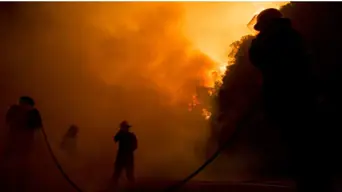Cape Town's heavy winter rain boosts vegetation growth, increasing summer wildfire risk
Claire Lotter, CEO of Volunteer Wildfire Services says that planning has been done to try to mitigate these potential fires.

A Cape Town Fire Fighters, Battles The Blaze / Picture Thomas Holderewn
Lester Kiewit interviews Claire Lotter, CEO of Volunteer Wildfire Services.
Listen below.
Cape Town and its surrounding areas experienced heavy rainfall this winter, particularly in July.
This increased precipitation often leads to faster and more lush vegetation growth.
However, when summer arrives, this abundant growth can heighten the risk of fueling wildfires.
"It does give rise to a lot of the flashy fuels heading into summer."
- Claire Lotter, CEO – Volunteer Wildfire Services
Lotter explains that in the Western Cape, extensive preparations have been made for what is termed 'fire readiness' to anticipate potential fire threats.
She notes that grasses and small fynbos plants tend to dry out more quickly and, as a result, become highly susceptible to catching fire.
In collaboration with the South African Weather Service, Lotter says that they use a fire danger index that considers factors such as humidity, wind direction, rainfall, and wind speed to predict and manage fire risks.
"We do plan a lot, there's a lot that goes into it."
- Claire Lotter, CEO – Volunteer Wildfire Services
Scroll up to the audio player to listen to the interview.